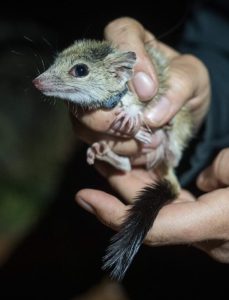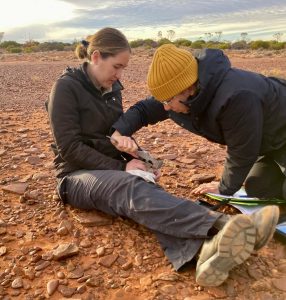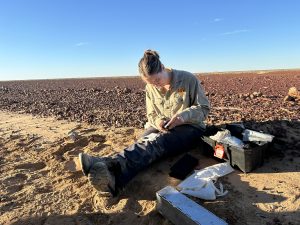


Molly Barlow, a PhD student at the University of Adelaide has been provided a grant to assist in her PhD project titled “Understanding the ongoing decline of a threatened arid mesopredator – the kowari (Dasyuroides byrnei)”.
Project details
Introduction:
The kowari (Dasyuroides byrnei) is a small carnivorous marsupial that was up-listed in 2023 from Vulnerable to Endangered under the federal Environment Protection and Biodiversity Conservation Act. Kowari occupy gibber plains interspersed with sand mounds in South Australia and Queensland, with all remaining populations in SA restricted to private pastoral properties. Recent research suggests they face a 20% risk of extinction in the next 20 years. However, as a severely understudied species, the nature of the current declines in populations is not well understood.
The aim of this project is to investigate threats that are hypothesised to be acting on populations of kowari in the wild. Through investigating the cause of population decline, this project will provide scientific results to land managers and conservation practitioners, that can be used to guide informed and appropriate conservation management of the species. The objectives of this project are as follows;
- Identify whether the extent of dispersal in wild populations is a factor limiting kowari population recovery, impacting their ability to establish new populations and re-colonise areas where they are locally extinct.
- Test relationships between predator activity and kowari presence, to determine whether predators limit dispersal or establishment of new populations.
- Assess the impact of pastoral activity, in particular the installation of new cattle water points in kowari habitat, and identify whether intensive pastoral activity is influencing kowari distribution and abundance.
- Use genetic data to measure the genetic health and population structure of kowari populations in SA and QLD.
Methods:
Chapter 1: To investigate juvenile survival and dispersal, capture-mark-recapture trapping surveys will be undertaken at Arid Recovery and Clifton Hills Station twice per year. During the second trip radio-transmitter collars will be fitted to up to 10 individuals. These juveniles will be tracked to understand dispersal behaviours and investigate the presence of physical extrinsic barriers that may be preventing geographic dispersal. Genetic analysis will complement the radiotracking data, to further assist in identifying the presence of dispersal barriers.
Chapter 2: To quantify kowari predation at varying distances to dune systems, remote camera grids will be established on South Australian pastoral stations. Three sets of baited cameras will be set varying distances from dunes. Detections will be used to estimate predator occupancy and activity levels. A similarly configured camera grid will be established at Arid Recovery to investigate whether kowari occupancy around dune systems is different, in the absence of introduced predators.
Chapter 3: To assess the impact of pastoral activity, long-term vegetation mapping from GIS platforms will be used to track changes in vegetation cover over time. This desk-based investigation will be replicated across Clifton Hills, Pandie Pandie and Cordillo Downs Stations, identifying approximate dates of waterpoint installation and assessing vegetation cover surrounding each waterpoint. On-the-ground assessment of sandmound condition (particularly compaction) will augment this.
Chapter 4: To measure genetic health, trapping surveys will be conducted across South Australian kowari populations twice a year and ear biopsies will be taken from each caught individual. Ear biopsy samples will concurrently be taken from Queensland populations by Queensland Parks and Wildlife staff and will be added to the collection. Once a sufficient spread of high-quality samples has been collected, these will be submitted for sequencing via DArT (Diversity Arrays Technology).
This research is conducted under:
– University of Adelaide Animal Ethics – Approval Number S-2024-016 – Expiry date 30/04/2028.
– Department for Environment and Water – Licence for teaching or experimentation with animals – Licence numbers 90 (Arid Recovery) and 007 (University of Adelaide).